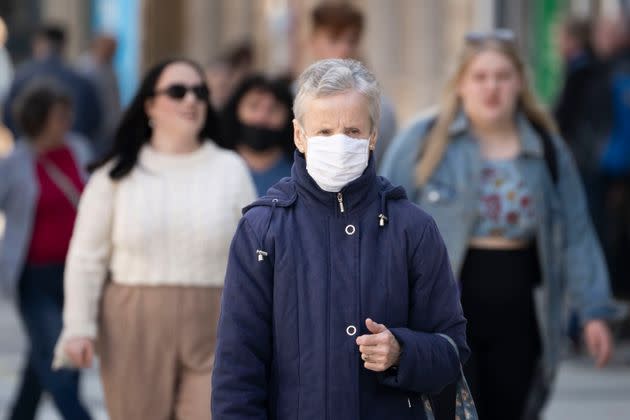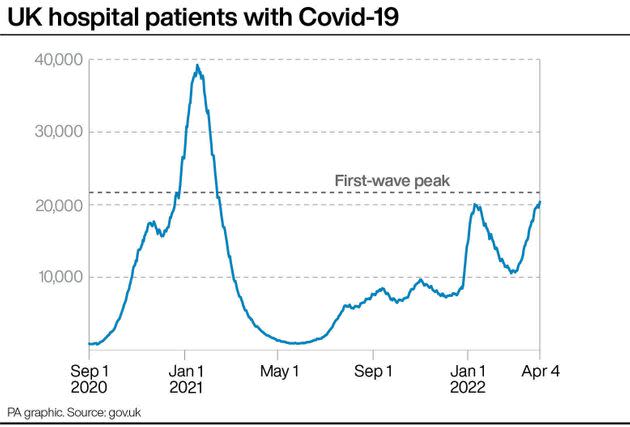Covid Levels Hit A Record High In March. Here's What Scientists Think Will Happen Next

There was an "unprecedented" rise in Covid cases in March after all social distancing measures were relaxed in England (Photo: Matthew Horwood via Getty Images)
Covid infections hit a record high in March – now scientists are trying to predict how the outbreak will impact people in the coming weeks.
Imperial College React’s study found that overall infections last month reach the highest levels recorded throughout the pandemic, based on swab tests from a random sample of 109,000 people between March 8 and 31.
The scientists used their findings to estimate that around 6.37% (one in 16) people in the UK had the virus during that time, up from 2.88% in February.
This was 40% higher than the rates recorded during the first Omicron wave in January, leading scientists to predict infections are doubling every 30 days.
The scientists said this increase was “unprecedented”, and believe the highly-transmissible Omicron strain, the BA.2 sub-variant, was responsible. We also now have another Omicron variant to contend with, known as Omicron XE.
It’s worth noting that this all restrictions were dropped in England during this time too, as No.10 adopted its “living with Covid” strategy.
So has this wave peaked?
This wave is thought to have peaked among children and younger adults as scientists at React said the infections appeared to be “plateauing” for people aged between 18 and 54.
However, it’s likely the virus will continue to be transmitted between people aged 55 and over, meaning this wave of infections isn’t over.
On March 31, an estimated 8.31% of the over-55 age group tested positive, which is 20 times the average prevalence recorded by React back in May 2020.
But hasn’t the booster programme helped?
Professor Paul Elliott, director of the React programme and chairman in epidemiology at Imperial College London, warned that older age groups might be more vulnerable because of waning immunity.
He told the BBC: “We also know many older people had their booster way back in October or November last year so it’s likely there will be some waning of the vaccine against infection, if not hospitalisation.”
He said that younger people received their third dose more recently than older people, and as the virus moves up the age groups there is cause for concern.
Prof Elliott said: “These trends are concerning since when a very high number of people are infected, this may lead to more people becoming seriously ill and needing to go to hospital.”
While the number of hospitalisations has not reached the same staggering heights seen back in January, they are already starting to climb again.

UK hospital patients with Covid-19. (Photo: PA GraphicsPress Association Images)
Did the study reveal anything about variants?
The team estimated 94.7% of the positive tests were from BA.2 (known as the Omicron stealth variant).
Surprisingly, the study discovered some other strains of Omicron in there, too.
The scientists said: “A very small number of recombinant Omicron variants were also detected (five XE and three XL), which are hybrids of the original BA.1 Omicron strain and BA.2.
“Because the number of these recombinants was so small, it’s not possible to tell from the data whether these variants are more transmissible than others.”
What else did the scientists find?
Vaccination is helping to reduce the spread of virus in secondary school-aged children.
While infections appeared to rise in all groups, the prevalence of the virus among secondary schools – where most pupils are now vaccinated – is half that seen in primary schools, where rates are significantly lower.
However, as Dame Jenny Harries, the chief executive of the UK Health Security Agency, said: “These latest study results are another reminder that the pandemic is not over and there is still a real risk to many of us catching Covid with infection rates so high.”
This article originally appeared on HuffPost UK and has been updated.

